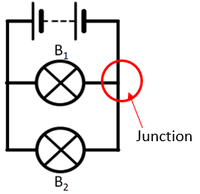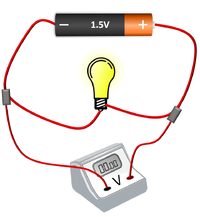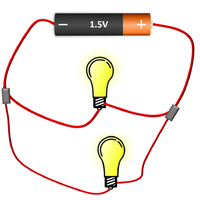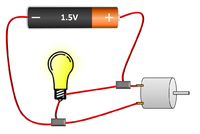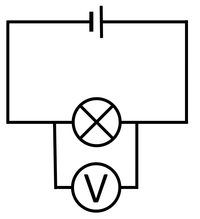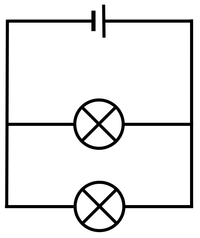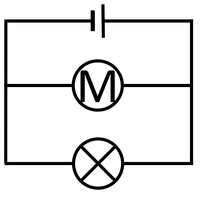Difference between revisions of "Parallel Circuit"
| Line 6: | Line 6: | ||
: In a '''parallel circuit''' the [[Electrical Current|current]] is split at junctions before taking a different path. | : In a '''parallel circuit''' the [[Electrical Current|current]] is split at junctions before taking a different path. | ||
: [[Electrical Component|Components]] placed in '''parallel''' with each other have the same [[Potential Difference]] across them. | : [[Electrical Component|Components]] placed in '''parallel''' with each other have the same [[Potential Difference]] across them. | ||
| + | {| class="wikitable" | ||
| + | |- | ||
| + | |[[File:CircuitDiagramBatteryBulbBulbParallel.png|center|200px]] | ||
| + | |- | ||
| + | | style="height:20px; width:200px; text-align:center;" |The [[Electrical Current|current]] from the [[battery]] splits at the [[junction]] sharing the [[Electrical Current|current]] between the two [[Electrical Bulb|bulbs]]. | ||
| + | |} | ||
===Examples=== | ===Examples=== | ||
Revision as of 13:57, 31 October 2018
Key Stage 3
Meaning
A Parallel Circuit is an electrical circuit with two or more paths the current can flow along.
About Parallel Circuits
- In a parallel circuit the current is split at junctions before taking a different path.
- Components placed in parallel with each other have the same Potential Difference across them.
| The current from the battery splits at the junction sharing the current between the two bulbs. |
Examples
| The cell, bulb and Voltmeter are in parallel so they have the same Potential Difference across them. | The two bulbs are in parallel so they have the same Potential Difference across them but may have a different Current passing through them. | The bulb and motor are in parallel so they have the same Potential Difference across them but may have a different Current passing through them. |
